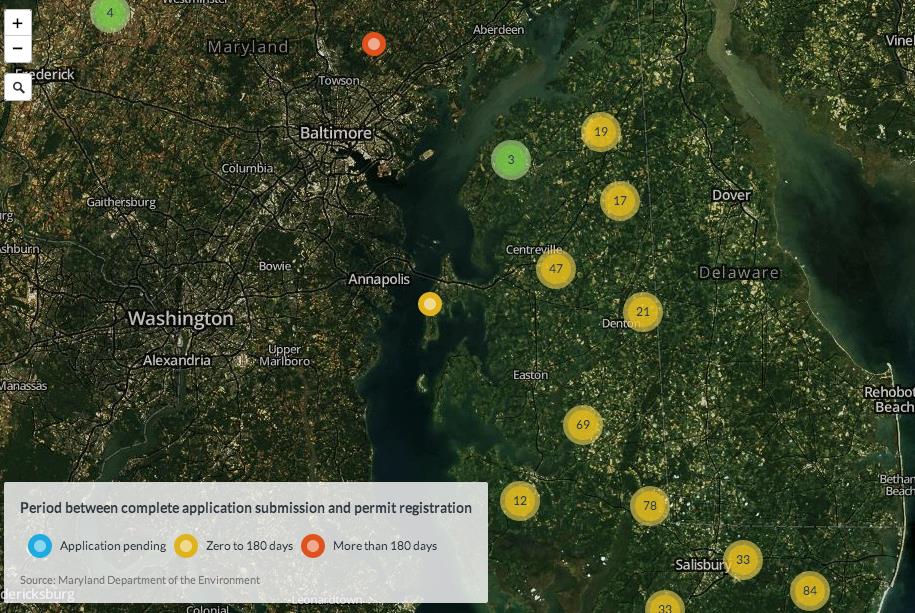
Maryland’s effort to limit pollution from massive industrial animal farms in the state is falling behind. A new CPR Issue Alert finds that the state has not registered 26 percent of Maryland’s concentrated animal feeding operations (CAFOs) and Maryland animal feeding operations (MAFOs), missing out on tens of thousands of pounds of pollution reduction in the Chesapeake Bay.
The Chesapeake Bay is in trouble. Years of half-hearted interstate efforts to check polluting emissions and restore the nation's largest estuary have failed. The Environmental Protection Agency’s Total Maximum Daily Load (TMDL) plan for the Bay represents the Chesapeake's last, best chance of recovery. The TMDL requires all major polluting sectors—including massive industrial farms—to reduce their discharges into the Bay.
Maryland is home to at least 588 of these massive animal farms, known as concentrated animal feeding operations (CAFOs) and state-regulated Maryland animal feeding operations (MAFOs). To meet the TMDL, Maryland has committed to eliminating the discharge of 248,000 pounds-per-year of nitrogen and 41,000 pounds-per-year of phosphorus from all animal feeding operations in the state by 2025. Meeting this goal will require robust government oversight.
Three years into the program, however, and Maryland has fallen far behind in permitting these facilities, missing a crucial opportunity to reduce pollution to meet the TMDL. Issuing permits is the only way to compel these facilities to follow certain best practices to limit pollutants  flowing into the Bay. Specifically, the CPR Issue Alert reveals:
flowing into the Bay. Specifically, the CPR Issue Alert reveals:
The permit writers are behind: 87 out of a total of 506 complete applications have yet to be processed, leaving operators with no clear requirements to reduce pollution and MDE with no enforceable conditions.
The CAFO program is understaffed, relying on three permit writers and the same number of inspectors. A loss of even one employee can cut the program’s productivity in half, as occurred in 2012.
Many of the applications MDE receives are incomplete: 65 of 540 CAFOs lack the required comprehensive nutrient management plans (CNMPs) that dictate how the facility is to operate to protect water quality.
MDE has so far given the industry a free ride: It has yet to collect application and annual fees for CAFO permits, which are $120 for small CAFOs, $600 for medium CAFOs, and $1,200 for large CAFOs. Collecting these fees would ensure that the program has sufficient resources to hire additional permit writers and inspectors.
As CPR President, co-author of the report, said, "Marylanders are required to pay a fee to get a driver's license or to fish for sport in the Bay. But large industrial farms are allowed to pollute for free. It's inexcusable, particularly because the state is so far behind in processing permits, and because the money the state is leaving on the table could pay for the staff that MDE needs to process permits and then enforce them."
A new interactive feature prepared for CPR by the Chesapeake Commons maps the location of the CAFOs and MAFOs in Maryland. The map illustrates the time it takes MDE to process permits and the time it takes for a farm to submit a complete application.
The authors recommend that:
MDE begin charging application fees;
MDE prioritize the processing of permits for the operations most likely to pollute, including the largest facilities and those that are located near an impaired waterway;
MDE increase its number of on-site inspections; and
EPA increase its spot inspections of CAFOs in the Bay watershed.
No amount of pollution can be left on the table if the state is to meet the TMDL.
Read the full report, or the summary. See the news release. Check out the interactive map.
Anne Havemann, Policy Analyst, Center for Progressive Reform. Bio.
| Be the first to comment on this entry. |